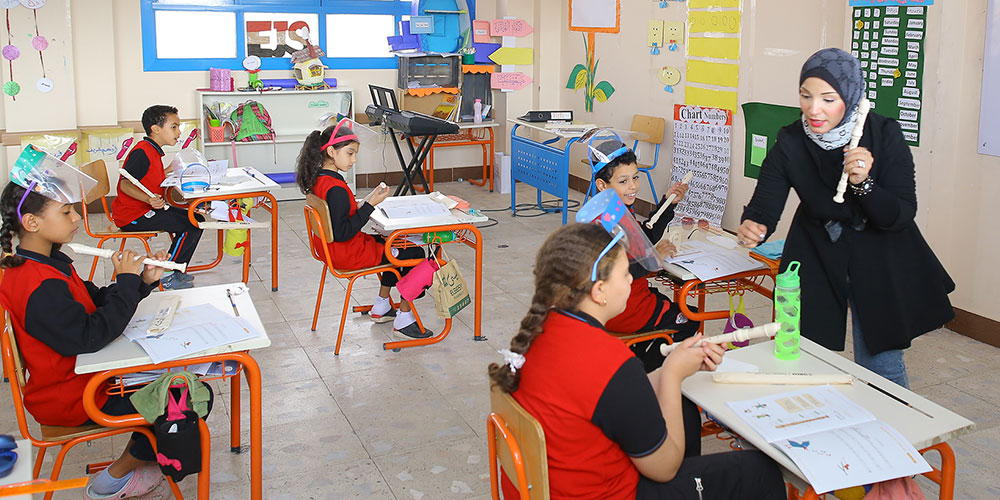
- School Project -
Contributing to the Well-Being of People around the World through Community-Rooted Instrumental Music Education Activities
Updated September 2022
Empowering the children of the future through the inspiration of sound, music, and musical instruments.
Since 2015, the Yamaha Group has been working together with government agencies and educational institutions around the world to advance the School Project. Primarily targeting emerging countries, this initiative entails supporting the incorporation of musical instrument performances into public education curricula. Through these efforts, we aim to provide opportunities to experience the joy of musical instrument performance to children who previously lacked such opportunities. We also provide training to school teachers and supply teaching materials to help create an environment in which anyone is able to continue receiving high-quality music education.
In November 2021, we launched School Project activities in Egypt, the seventh country to receive support through this project. In addition to introducing children to the joy of musical instrument performance, we are also using these activities as an opportunity to accumulate expertise regarding the deployment of Japanese-style education.
![[ icon ] 4: QUALITY EDUCATION, 10: REDUCED INEQUALITIES, 16: PEACE, JUSTICE AND STRONG INSTITUTIONS, 17: PARTNERSHIPS FOR THE GOALS, JAPAN. Committed to the SDGs](images/pict_icon.jpg)
Instrumental Music Education Opportunities Provided to 1.29 Million Children in Seven Countries
The benefits of instrumental music education are so well documented that such instruction is standard in schools around the world.
However, schools in some countries are often unable to provide musical education at a satisfactory level due to a lack of equipment or trained teachers or inadequate curriculum.
Through the School Project, Yamaha is working in close coordination with local government agencies and educational institutions to communicate the joy of musical instrument performance through public education. As of March 31, 2022, we have provided opportunities to learn musical instruments to an aggregate total of 1.29million children in seven countries—Malaysia, Indonesia, Vietnam, India, Brazil, United Arab Emirates (UAE), and Egypt—while also supporting the development of environments for enjoying musical instrument performances in these countries.
In Vietnam, we have been working with the Ministry of Education and Training to offer support for recorder seminars for school teachers and for teaching material revisions through two projects, one of which has been adopted as a 2016 EDU-Port Certified Project while the other was adopted as a 2018 EDU-Port Supported Project by EDU-Port Japan, a public-private, nationwide initiative that aims to introduce Japanese-style education overseas by providing a platform from in which the public and private sectors collaborate in achieving this objective. Through these efforts, we succeeded in having instrumental music education introduced into the course curriculum guidelines for this country in 2021.
We have also been promoting the popularization of recorders in Brazil for a number of years. In this country, we have arranged online recorder seminars to continue these activities amid the COVID-19 pandemic.
Meanwhile, in India, where recorders are already well established, we have launched new instrumental music activities using keyboards. In efforts such as these, we are flexibly tailoring our School Project activities to the characteristics of each region. In 2023, the School Project is scheduled to be expanded to Mexico, its second Latin American country.
In the years to come, Yamaha will continue its efforts to teach as many children as possible about the fun and joy of musical instruments as we work toward the target of providing such educational opportunities to an aggregate total of 2.3 million children by fiscal 2025 described in the medium-term management plan.
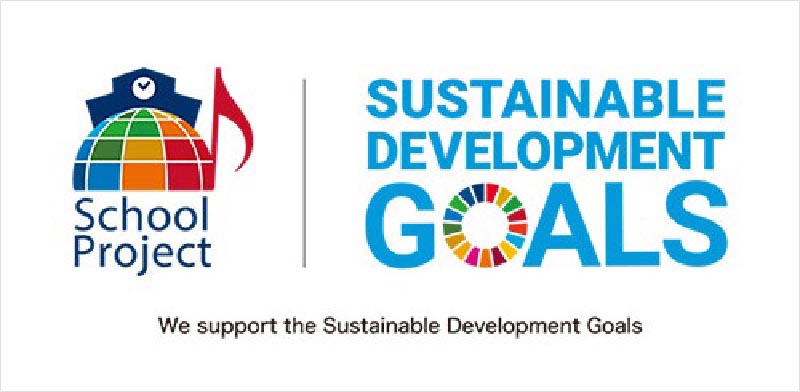
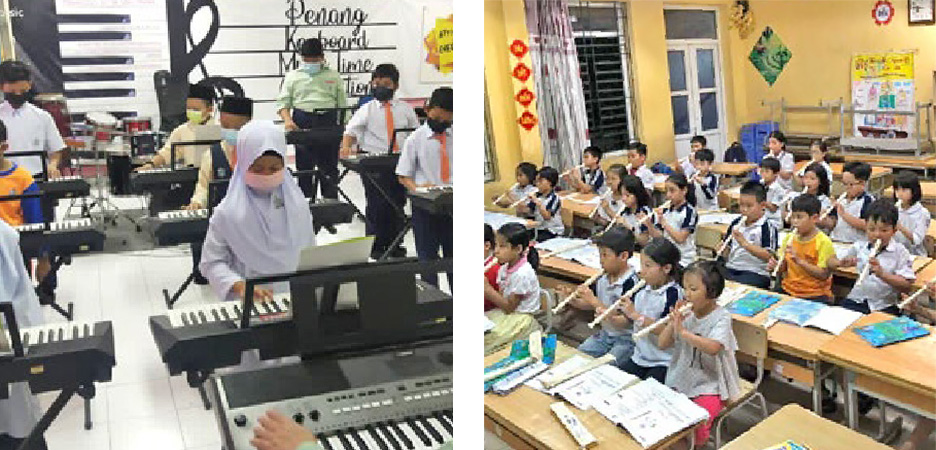
![[ image ] Medium-Term Management Plan Target](images/pict_04.jpg)
Export of Japanese-Style Education Adapted to Local Conditions through Industry-Government-Academia Coordination

Provision of Instrumental Music Education to Egyptian Children as JICA-SDGs Partner
Yamaha began supporting music classes using recorders in Egypt in November 2021. As part of this undertaking, we concluded a subcontracting agreement with Japan International Cooperation Agency (JICA) with regard to this project as part of JICA’s SDGs Business Supporting Surveys in the subcategory of projects for social issues in Africa through feasibility studies regarding the introduction of Japanese-style instrumental music education methods into elementary school education. We have thus been working to introduce instrumental music education into Egyptian schools based on this contract as a JICA-SDGs partner. In this manner, Yamaha has been coordinating with the educational agencies of both Egypt and Japan to promote education approaches for developing the non-cognitive skills*1 of Egyptian children through instrumental music education. We thereby aim to create a sustainable business that will help advance the popularization of music in a way that is congruent with Egypt’s education traditions.
- 1 :Non-cognitive skills: Goal accomplishment, cooperation, emotional control, and other skills pertaining to one’s thinking, emotions, and behavioral patterns thought to have an impact on life after becoming an adult and to have a connection to the development of cognitive skills such as reading, writing, and calculation
![[ photo ] Provision of Instrumental Music Education to Egyptian Children as JICA-SDGs Partner](images/pict_06.jpg)
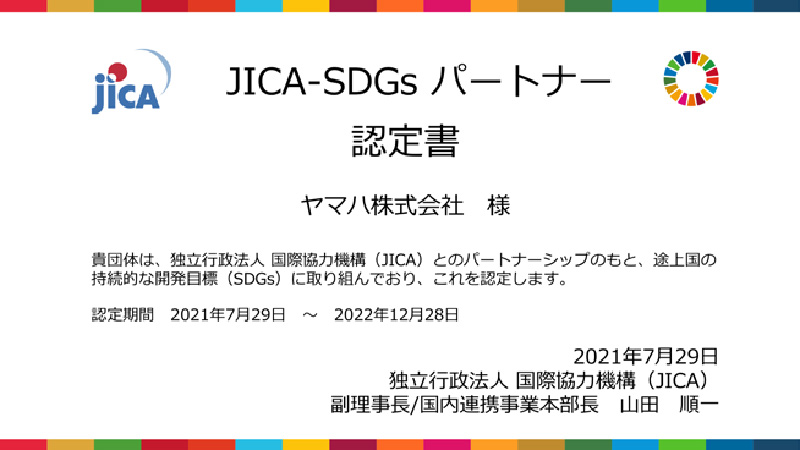
Rising Global Attention toward Non-Cognitive Skills and Japanese-Style Education
One reason why Japanese-style education and Yamaha’s School Project is garnering attention in Egypt is the country’s pivot away from its prior emphasis on condensed, intensive classes focused on scores to promote education that embodies a more robust approach toward human development.
Non-cognitive skills that cannot be gauged through test scores, such as sociality, cooperativeness, and discipline, are increasingly becoming an area of focus at educational institutions around the world. These skills are tied to emotional capacities and fundamental social engagement and thus are indispensable to the development of enriched societies.
Non-cognitive skills develop the fastest in early childhood. Accordingly, academic institutions around the world have been researching the benefits of non-cognitive skills and the methods of fostering such skills.
One finding has been the beneficial impact that music and instrumental music education has on the development of non-cognitive skills.
Yamaha believes that support for music education programs involving musical instrument performances will help resolve the issues faced in Egypt’s education approach. Gaining inspiration from the OECD Education 2030 Project,*2 we thus thought to propose interactive classes that use recorders.
This project was selected as a 2020 EDU-Port Supported Project to receive support from the Ministry of Education, Culture, Sports, Science and Technology, as was also the case with the 2016 EDU-Port Certified Project and 2018 EDU-Port Supported Project carried out in Vietnam. School Project activities were commenced in Egypt following trial lessons at 10 schools operated by Egyptian Japanese School.
Going forward, Yamaha will continue to advance surveys and research on the educational benefits of instrumental music education using recorders together with Tokyo Gakugei University Children Institute. We thereby aim to develop scientific evidence on the benefits of instrumental music education for cultivating non-cognitive skills in academic settings, based on which we will seek to introduce this educational approach at all 48 schools operated by Egyptian Japanese School.
- 2 :OECD Education 2030 Project: Project established by Organisation for Economic Co-operation and Development (OECD) in 2015 to call upon the insight of OECD member countries to determine what education approaches will be necessary to foster children able to survive in the world of 2030, which is expected to be affected by various, global-scale changes
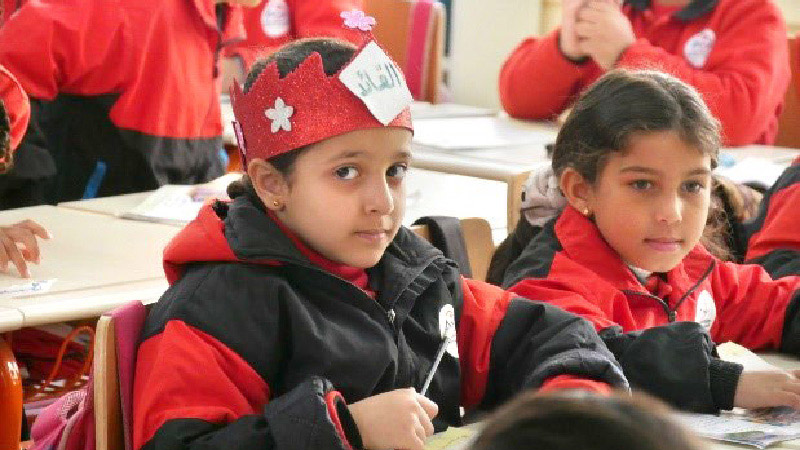
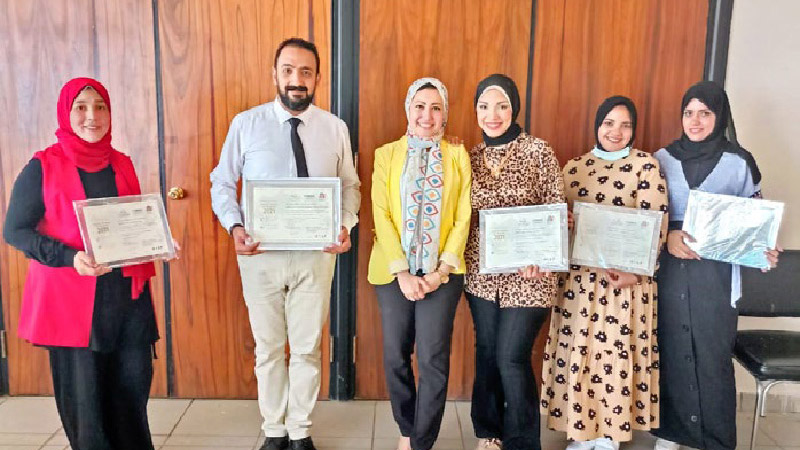
Contributions to a Peaceful World in Which the Joy of Music and Musical Instrument Performances Enriches Lives
Yamaha is advancing School Project activities together with government agencies and educational institutions around the world to provide a greater range of children with equal opportunities to experience musical instrument performances.
The School Project goes beyond helping children who may have never had the chance to play a musical instrument learn the joy of musical instrument performance to contribute to their healthy development by fostering emotional sensitivities, creativity, and cooperativeness.
Yamaha envisions a future in which everyone in the world is able experience the joy of playing musical instruments and learning about music and continue to feel the emotionally enriching benefits throughout their lives. The School Project and our other music education programs are our vessel for realizing this future and contributing to the development of a sustainable musical culture.
COMMENTS
Invaluable Opportunity for Children and School Teachers Alike
I was honored to hear that our school would be a pilot participant for the recorder class project. Recorders are not well known to the people of Egypt, and the children did not know what to make of them at first. After a couple of weeks, though, they were having fun playing simple songs. This proved to be an invaluable opportunity for the children and school teachers alike.
![[ photo ] Eman Hassan](images/pict_10.jpg)
Eman Hassan
Motivating Project that Should Be Continued
Getting to see children have such fun in recorder classes was an incredibly motivating experience, and I thus greatly enjoyed taking part in this project. I hope this project will be continued in the future.
![[ photo ] Noura Adel](images/pict_11.jpg)
Noura Adel
Constant Companion Found in a Recorder
Recorders are a great instrument because they are lightweight and can be taken anywhere. My daughter’s recorder is a constant companion that she takes wherever she goes. I was so proud when she took it to her grandmother’s house to hold a performance. This brought a smile to my face.
![[ photo ] Suzan Youssrf](images/pict_12.jpg)
Suzan Youssrf

![[ Image ] Cultivating Lush Forests Together with the Local Communities to Support the Production of High-Quality Instruments](/en/stories/feature/feature-14/images/pict_main.jpg)
![[ Image ] Contributing to the Well-Being of People around the World through Community-Rooted Instrumental Music Education Activities - School Project -](/en/stories/feature/feature-15/images/pict_main.jpg)
![[ Image ] Shaping an Inclusive Future in which Everyone Can Know the Joy of Playing the Piano Respects One Another](/ja/stories/feature/feature-16/images/pict_main.jpg)